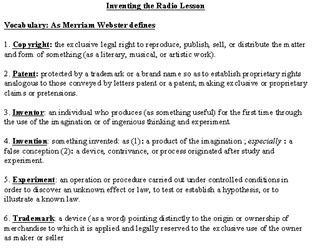A Lesson Plan and Project On the Invention of the Radio
Many people not only students never think to ask where some daily objects have come from such as a stove, computer, or even the radio. Here we will look at a lesson plan for the history of the radio and the inventor of the radio.
The Beginning of Radio:
Not many people know this but there was talk about transmitting radio waves before Marconi invented the radio. Some notable names include James Clerk Maxwell, Heinrich Rudolph Hertz, and Mahlon Loomis. These three individuals all worked on the idea of transmitting radio waves, projection of radio waves into space, and wireless aerial communication in the 1860’s.
It wasn’t until 1895 though that an Italian inventor, Guglielmo Marconi, sent the first actual radio signal. Some other notable dates for Marconi included:
- 1894: Marconi began experimenting with “Hertzian” (radio) waves
- 1897: Obtained patent & established the Wireless Telegraph and Signal Company Limited 1899: First wireless signal across English Channel 1902: First successful transatlantic radiotelegraph message
Lesson Plan
1. Ask students about any prior knowledge they may have about the radio or inventors. You may be surprised as the information you receive may be mixed. This is because thee has been dispute as to who actually invented the radio. Another name you may hear come up and if you do not you can explain this individual; to the students:
- Nikola Tesla: Took out patent for wireless radio transmitters
- 1943: Supreme Court overturned Marconi’s patent in favor for Tesla’s patent.
2. Read with the class: “Inventing the Radio” by Marianne Fedunkiw. This book gives a nicely detailed history of the radio ranging from “Before the Radio” up to the “Future of Radio”.
3. Explain to students the definition of patent and copyright. Explain why there is such discretion as to who may have actually invented the radio. Ask leading questions about this to get the students involved:
- Why would there be discretion as to who invented the radio?
- Has there been any discretion as to who invented other inventions?
- What do we think about Marconi’s patent getting overturned?
4. Vocabulary: List below and worksheet will be found to be very useful in this lesson.
5. Junior Inventors: Have the students think about various ideas and think about what they would invent. Ask leading questions:
- What is needed in daily life which we do not have yet?
- How would you make it?
- What is the purpose of this invention?
- Are we sure it does not already exist?
- What are the steps needed to get the copyright/patent?
This is a final project which can be given to students over a few days or weeks…whichever the teacher prefers. This will help the students not only use their imagination, but also use computer research and library research skills. Have students use as least one library source and at least one computer source; this will help give a nice array of information. It will also help the students fine tune research abilities.
Include in your directions:
- Invent something
- Draw this invention/Blueprint
- Use questions above (#5) to prepare the information into a report.
- Report should be 2-5 pages long.
- Use relevant vocabulary from the worksheet in your report.
- Use relevant resources from library and computer.
- Prepare presentation using divided poster board.
Have students present their invention and report to the class on various days. Who knows maybe one of your students may actually be the next inventor! After this lesson students will know more about the rich history of radio as well as the true inventor of the radio.
